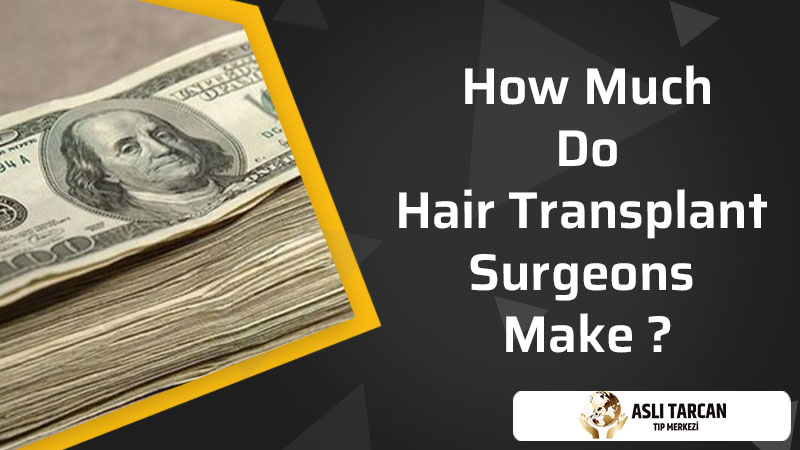How Much Do Hair Transplant Surgeons Make Hair transplant surgeons use surgical transplant treatments to help men and women restore their youth. How much do hair transplant surgeons make? Plastic surgeons are among the top paid surgeons in any specialty, with incomes frequently exceeding the national average for doctors and surgeons. Surgeons in this specialty frequently spend a significant amount of time in residency training after graduating from medical school.
How Much Do Hair Transplant Surgeons Make
How much do hair transplant surgeons make? According to 2010 data from the US Bureau of Labor Statistics, the median annual compensation for all physicians in the United States was $166,400. This remuneration, on the other hand, is representative of all physicians and general surgeons in all specialties. According to the statistics, surgeons who specialize in one area of surgery earn roughly twice as much as general doctors and surgeons. So, how much do hair transplant surgeons make? According to a private company’s physician remuneration survey, in 2009, the typical salary for physicians who performed cosmetic surgery, including hair transplants, was around $389,000 per year. Of course, these are data from 10 or 11 years ago. Today, thanks to the increasing technology and developments in medical science, there have been changes in these numbers.
The going rate of surgeons in each location of the country can affect the salary earned by hair transplant surgeons. According to AMGA data, these surgeons’ median incomes differ by geographic region. How much do hair transplant surgeons make? Cosmetic surgeons in North America, for example, earned a median pay of $414,500 and were the highest paid transplant surgeons in the country. South Americans, on the other hand, make around $389,000 per year, with those in the east earning $337,000 and those in the west earning $398,000.
What Is Hair Transplantation, And How Does It Work?
Hair loss, which affects both men and women, is a significant aesthetic issue in today’s society. Hair transplantation is the procedure of removing hair or hair from the body’s tissue and transplanting it to another body or balding area (without hair or in another part of the body). Thus, hair transplantation is a sort of tissue transplantation that is performing using the patient’s own tissue.
Under local anesthetic, the Aesthetic and Plastic Surgery Specialist removes a piece of tissue containing live hair follicles as a block (FUT) or individually (FUE) and divides it into single, double, and triple groups. With local anesthetic, these hair follicles are totally opening (without hair) or thinned areas by opening micro channels under the skin; it is then transferring into these channels one by one and the process is complete. Since hair transplantation such as eyebrows, eyelashes, beard, mustache, and arm hair has just recently being done, the term of ‘Hair Transplantation’ is insufficient. The right definition is ‘Hair Root Transplantation.’
Hair Evaluations
Hair evaluations are performing by our patients’ aesthetic surgeons in the Hair Transplantation Unit, and they are providing thorough information about their baldness and hair transplantation treatment plans. The degree of openness and sparseness, as well as the health and frequency of non-shedding hair follicles on the neck, are examining during this examination. A complete hair analysis report is creating, and the individual is told about his hair’s condition. Hair Transplantation is conducting if the hairy area on the person’s nape is sufficient to cover the opening; if this area is not acceptable, information about other ways is providing.
Experts compile a complete hair analysis report in hair transplantation institutions, and the person is educating about their hair. Hair transplant professionals use hair analysis to discover your hair problems, organize your hair treatment, realistically report favorable treatment results, and provide an appropriate treatment to their patients.
FUE Method
FUE has been one of the most popular hair transplantation technologies in recent years. How much do hair transplant surgeons make? There are no general surgical complications with FUE hair transplantation. Because it is not a surgery like other hair transplantation techniques. There is no pain, incision, infection, bleeding, or scarring.
Follicular Unit Extraction, or FUE, is the procedure of extracting hair from the scalp one by one with punches slightly smaller than 1 mm using the Micromotor method under local anesthetic and without surgery, using hair from the upper region of the neck and above the ears. Sutures are not necessary because no incision is make during this treatment. Hair follicles that have been removing are maintaining in cell water until hair transplantation may commence. Today, 9 out of 10 patients are treating using this strategy, which is base on their preferences. The benefits of the FUE method include the absence of a scar on the skin, a better success rate of transplantation. And the ability to transfer more hair follicles than with the FUT method.
Post-Procedure Recommendations
- Take your medication and follow your doctor’s recommendations one by one.
- Due to drug use, do not consume alcohol or comparable substances.
- After the operation, do not drive for 1 day.
- Avoid strenuous activity for the first 2-3 days following hair transplantation.
- Avoid high-intensity sports and stressful surroundings.
- Do not engage in sexual activity for at least 2-3 days after the operation.
- Friction, scraping, and other stresses should be avoiding in the transplant area. For ten days, protect yourself from natural external elements such as sunshine and wind by wearing a hat outside.
- Lie down flat on your back.
- When washing your hair, don’t overfill the planting area.
- While shampooing your hair, give it a little massage but avoid massaging the planting region.
- For a set period of time, avoid using the hair dryer.
- And, for 15 days, stay away from cosmetics like spray, paint, and jelly.
- For ten days, do not go into the sea or a pool.
Why Should Hair Transplantation Be Performed At A Hospital?
Hair transplantation is a significant medical treatment that should be carry out in a hospital setting with the highest possible cleanliness standards to avoid complications. Hair transplantation should only be done by a skill and experience aesthetic-plastic. And reconstructive surgery specialist and a specialized health technician. Only plastic surgeons, dermatologists, and surgical teams are permitting to execute this treatment under our legislation.
How Much Does It Cost to Get a Hair Transplant in Turkey?
If you are looking for an affordable hair loss treatment for your problem, getting a hair transplant in Turkey is a great option due to how much does it cost to get a hair transplant. Depending on the institution and the type of hair transplant, prices can vary. Additionally, you can choose any hair transplant Turkey package available that includes additional services such as accommodation or post-operative care. Furthermore, many of the clinics offer financing options so that patients can spread out payments over time. Also, it is essential to choose a qualified and experienced surgeon who offers good patient care and high-quality results.

Overall, getting a hair transplant in Turkey is not only affordable when thinking “how much does it cost to get a hair transplant?”, but also provides quality treatment with experienced surgeons and advanced medical technologies. Additionally, Turkey offers some additional advantages to those considering having a hair transplant there. The country is known for its medical tourism market and has many world-class clinics with well-trained staff who speak English well. Moreover, traveling to Turkey is easy and convenient with multiple international airports around the country offering direct flights from most major cities worldwide.



